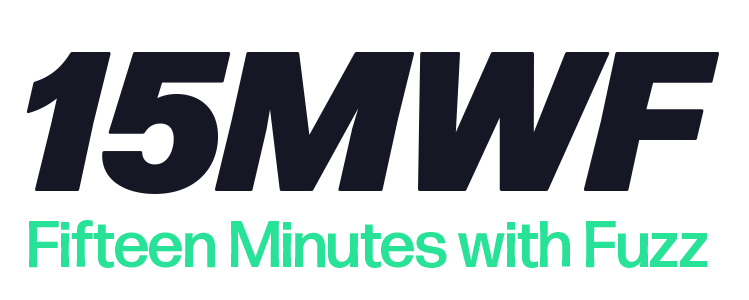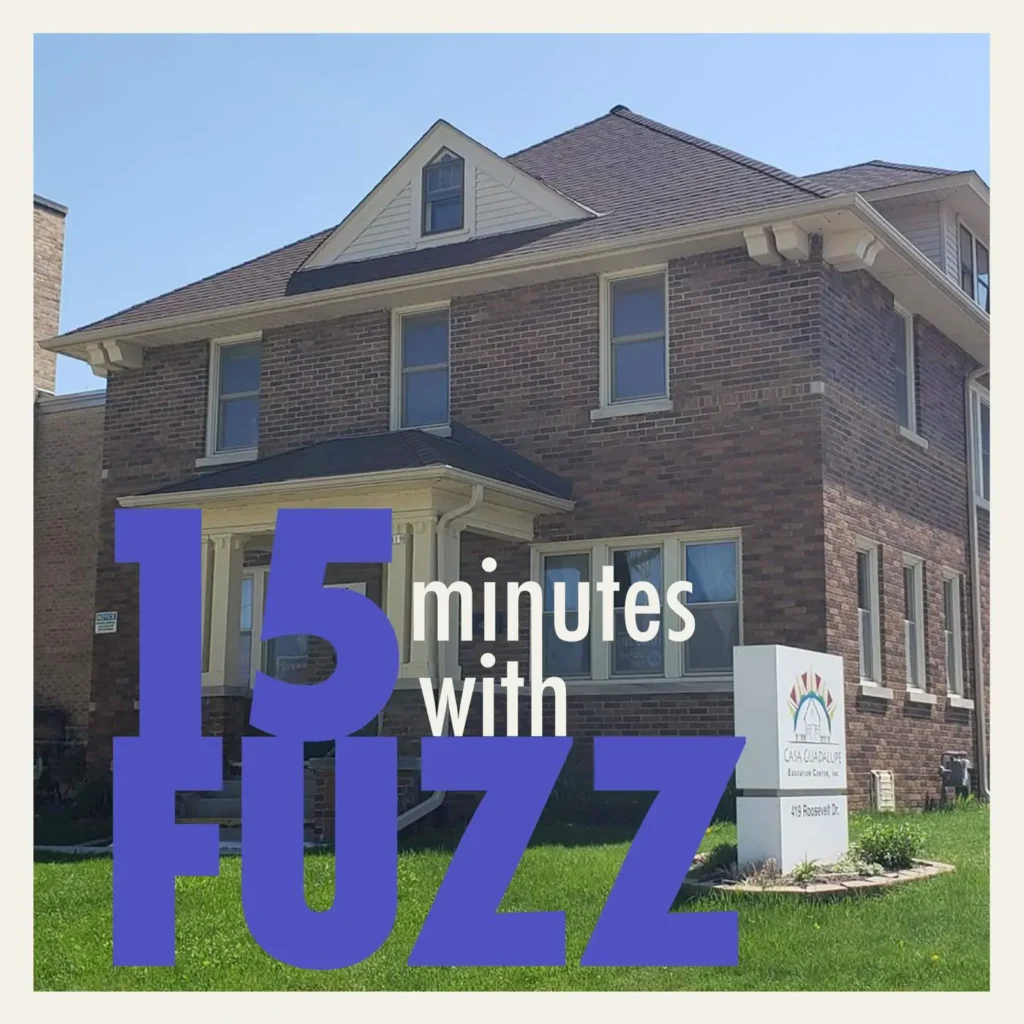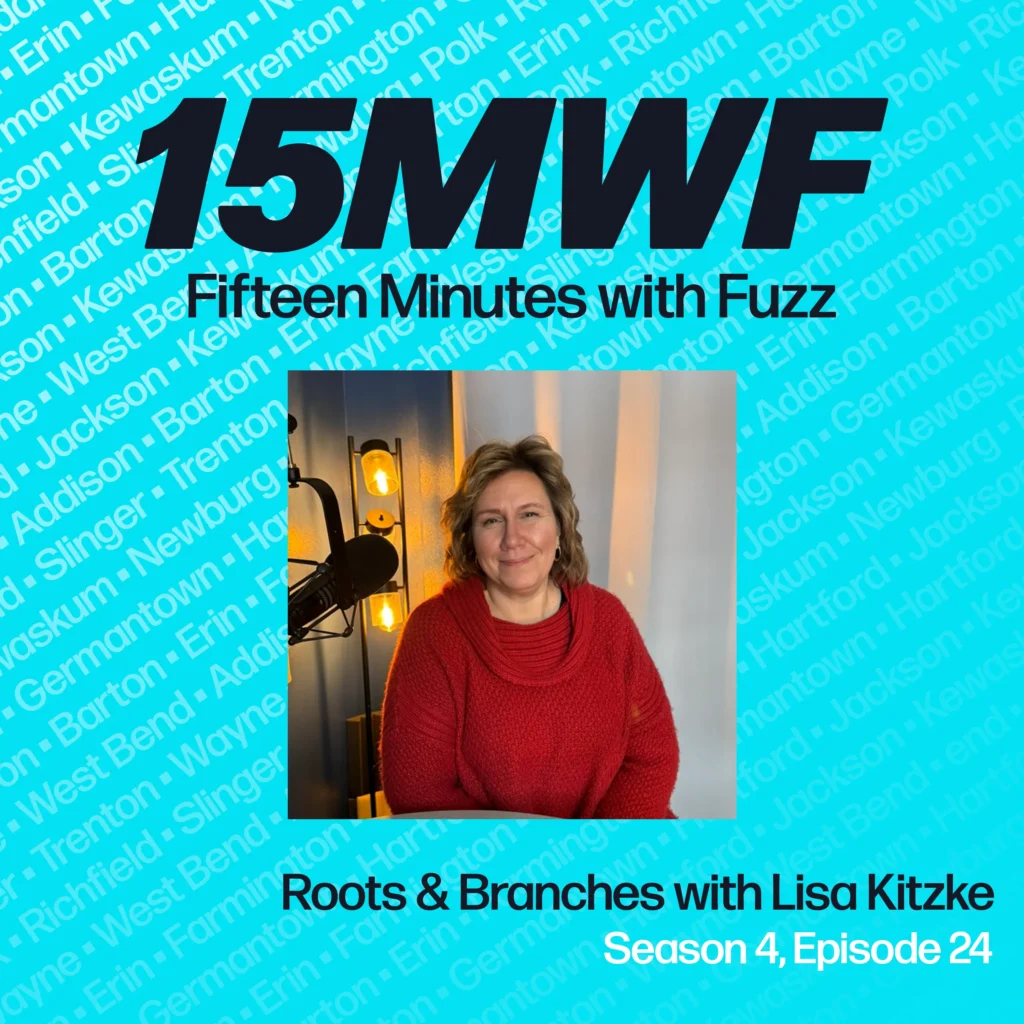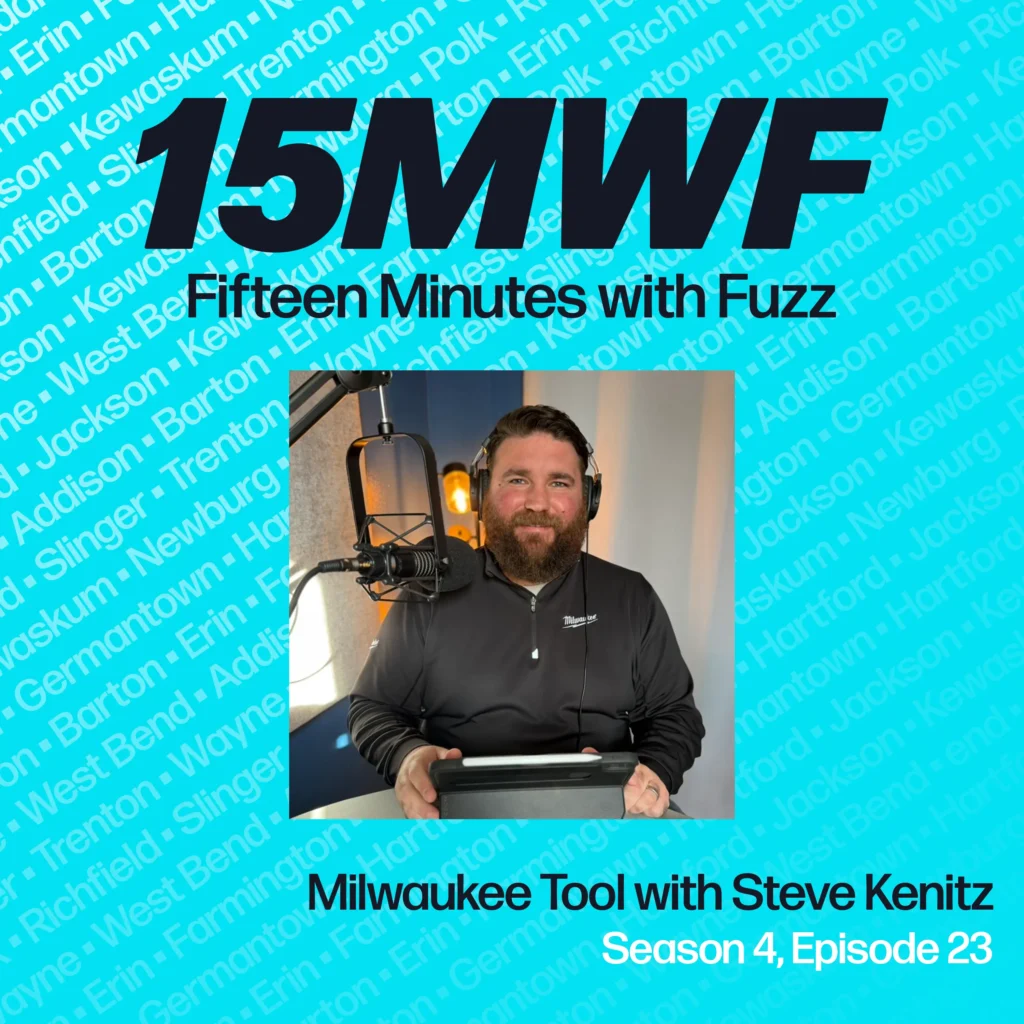Noelle Braun joins me to talk about Casa Guadalupe, an organization that aims to “be the bridge of integration to Hispanics and to the communities in which they live through education and community access.” We have a great conversation about the programs they offer and how the organization helps those who live in Washington County.

Fifteen Minutes with Fuzz
A podcast about positive things happening in and around Washington County, Wisconsin
Casa Guadalupe with Noelle Braun
Transcript
(click to expand)[00:00:00] Fuzz Martin: My friends, thanks for tuning in to another episode of Fifteen Minutes with Fuzz. We are on the 14th episode. And honestly, I’m just glad I’ve been able to do anything consistently for 14 weeks in a row. Especially like, late stage COVID. Life’s a little different now, you know? I’ve been having a lot of fun learning about great organizations, events, things going on in Washington County, Wisconsin.
By the way, also learned there’s like a Washington County in every single state. In the nation. I don’t even Maybe Hawaii even has one. I don’t know. But There are many. Anyway, I’m looking forward to learning even more. If you ever have an idea for the show, there’s somebody I should interview, an organization, a person, an event going on, go to my website, 15withfuzz.
com, click on contact at the top or bottom of the page, drop me a line, let me know who I should be talking to, and I’m always looking to learn about things that I’m not familiar with. This show is really, has been a selfish way for me to expand my horizons, and hopefully, I’m expanding yours a bit along the way.
Again, 15withfuzz. com, or you can email 15withfuzz at gmail. com. Speaking of, on this episode, I’m speaking with Noelle Braun. She’s the executive director behind Casa Guadalupe. It’s a nonprofit organization that aims to be the bridge of integration to those who identify as Hispanic or Latino and to the communities in which they live through education and community access.
So, Here we are. Fifteen Minutes on Casa Guadalupe with Noel Braun on Fifteen Minutes with Fuzz.
Noel, thanks so much for joining me today. Let’s talk a little bit about Casa Guadalupe. And I see a lot of references on your website and on some social things about how Casa Guadalupe is building the bridge. What does that mean as an organization and what does that mean to you?
[00:02:32] Noelle Braun: Absolutely. Well, thank you so much for having me.
When we talk about Casa Guadalupe and our mission to be this bridge of integration to Hispanics in the communities in which they live through education and community access, we do think of ourselves as these holistic connectors between the Spanish speakers and non Spanish speakers in Washington County.
So we do. do offer these resources for newcomers to the community who are from Spanish speaking countries living here, working here, raising their families here. But with that, you know, in a predominantly English speaking community, there comes certain barriers. And so we, uh. are that link that we’re bringing, you know, individuals to the right resources in such a variety of areas.
I mentioned like a holistic connector because it could be like for their health, their well being, you know, through the school system, through jobs, or like just daily life in general. So we are really proud to be that in the community. And then we also look at ways to bring our growing diversity.
community together, um, and to celebrate our cultural differences. And so that’s another way that we like to be a bridge as well.
[00:03:42] Fuzz Martin: Very good. And you’ve been in Casa Guadalupe for a while now, right? So how has it grown and adapted and how has the county kind of grown and adapted over the years?
[00:03:52] Noelle Braun: Yes, so Casa Guadalupe itself was founded in 2006 by Mary Lynn Bennett and Father Rafael Rodriguez, and I had the opportunity to start as the executive director in 2012.
And so it really has grown over the years. There is a wonderful vision for Casa early on with seeing our community changing as far as Far as more Hispanic Latino community members moving here. And so we started out providing English classes. That was a primary goal. Knowing there are Spanish speakers in our community, life will be easier in our community if people learn more English, you know, in their jobs and just daily life.
So we’ve continued that since the start. And when I started, we also were just starting an afterschool reading program for Hispanic Latino elementary school students in the West Bend School District. So. Since then, uh, fortunately, you know, thanks to funding, of course, through grants, you know, received by local private foundations, organizations, generous community members, etc.
Over the years, we have been able to add to our staff and, you know, without that staff capacity, you can’t grow as much. So, fortunately, we have people in place that have grown our programs, such as our after school reading program. We started a program for Hispanic Latino high school students that was just in the West Bend school district.
Now it’s in West Bend, Hartford, and Kewaskum. So we, we are casting this net, um, in Washington County to work with the Latino individuals. Uh, we also started a larger health program initiative called Healthy Latinos, Healthy Futures. Some are Spanish camps, some are reading programs. There’s so many things that fortunately through collaborators on our staff and volunteers that we’ve been able to offer now.
[00:05:38] Fuzz Martin: Sure, and that’s, that’s all here in Washington County, right?
[00:05:41] Noelle Braun: Exactly, just in Washington County.
[00:05:43] Fuzz Martin: How many people are West
[00:05:52] Noelle Braun: Bend, Kewaskum, Slinger, West Bend, Kewaskum, Slinger, West Bend, Kewaskum, Slinger, West There are younger families that we’re serving. So, if you look at that number, almost half of them would be under the age of 18.
So, those that we are working with closely, for the most part, are individuals, adults, that have moved here from a Spanish speaking country and are now raising their families here. And so, So, with that comes some different like generational things as well because then you get the first generation children here.
Just like any immigrant story right? We’ve all come from somewhere for the most part here in the U. S. right here in our community. And so, but again, it’s mostly focused on those that are newcomers and then like raising their families. So, on an average year, we see. West Bend, Kewaskum, Slinger, West Bend, Kewaskum, Slinger, West Bend, Kewaskum, Slinger,
[00:07:02] Fuzz Martin: West English speakers Spanish.
Exactly. And then, but in most day to day, you’re helping Spanish speakers learn English and help become part of the community, be able to interact in all those pieces as well. Yes, absolutely. So the, again, you said the after school reading program is in West Bend, Kewaskum, and Hartford?
[00:07:24] Noelle Braun: Right now, that is called the Read to Succeed program, so we’re definitely still in the West Bend School District, and we are in Hartford now.
So those are those two main communities. We do have a Dream to Succeed program that has moved into the Kewaskum School District as well. That started out as just high school students that identify as Hispanic or Latino, and it’s a college life and career readiness program. There’s a lot involved in it, but we have a wonderful coordinator named Maria that actually helps with all of our youth programming.
But that one is definitely in those three school districts we’re looking into Slinger. Definitely as far as like our staff capacity too, there’s like a core group of five of us, and then we also have some instructors. As well who teach English and Spanish
[00:08:09] Fuzz Martin: if somebody wanted to get involved. Like what, what types do you need volunteers?
What types of things does Casa Guadalupe need?
[00:08:16] Noelle Braun: Absolutely. So just like any nonprofit organization Yeah. You know, volunteers are so important. Mm-Hmm. and so needed, we, you know, our staff, we can’t do it all. Mm-Hmm. . Um, so volunteers on an average basis, on annual average, I would say we have around like 150 volunteers, which is fantastic.
Yeah. That’s great. Yeah. Some of them do just one day event. I’m like our Fiesta Latina fundraiser, our largest of the year. Others are more consistent, like they’ll help with the Read to Succeed program, and they’ll show up on a weekly basis to work with kids. Where we’re really looking for volunteers at this moment, we are looking for people who would like to tutor adults.
So we do offer English classes still, but inevitably there are adults that have different work schedules. The times that we offer classes just don’t match up. West Bend, Kewaskum, Slinger, West Bend, Kewaskum, Slinger, Kewaskum, of course had to adapt during COVID and provided some virtual classes. So there are opportunities for both of those.
And it really is just trying to pair people up as best as possible based on the volunteer and the student schedule. We are also currently looking for individuals who love working with kids and can help provide childcare during English classes or other programs. For instance, we’re having a health program.
program coming up soon. It’s like a six week program on Monday evenings. And so we recruit and we look for people that can help just watch like a small group of kids. That way it can break down that barrier for the parents. So they, they can say, Oh, you know what? You got child care taken care of. Great.
Now I can attend this program that will benefit them. Um, same thing with English classes. So definitely looking for child care, Tuesday, Thursday mornings. Um, in West Bend from 1030 to noon, and in the evenings we have English classes on Tuesdays, Thursdays from 6 to 730. And again, just as things pop up. So that’s where our biggest volunteer needs are at the moment.
[00:10:15] Fuzz Martin: And those are all at your Casa Guadalupe building, is that correct?
[00:10:19] Noelle Braun: The majority of them are. So, yes. So our Casa Guadalupe office is in West Bend at 419 Roosevelt Drive. It’s in Barton, technically, right next to St. Mary’s Church, so we have our space there. We actually offer our Read to Succeed program in West Bend in the gymnasium at St.
Mary’s, which evolved because of COVID, provides a large space, we can bring kids from multiple schools to one location, so that’s been working out pretty well. In Hartford, we utilize a variety of locations. Currently, our English classes are at St. Mary’s. St. Eden’s Episcopal Church in Hartford. And we’ve utilized the United Way Resource Center at times as well.
So if anyone is interested in volunteering and they felt the application go through the process then we would certainly let them know those locations. Yeah,
[00:11:02] Fuzz Martin: and then if somebody does want to get involved, what’s the best way to start?
[00:11:05] Noelle Braun: Yes, so if anyone is looking to get involved in, on a volunteer basis, filling out that application is the best start.
So we, um, on our website, we do have a pretty user friendly space to find where the application is. It’s in a Google Form format, so they can go and click on that link and fill it out and we check that constantly to make sure that we’re following up with volunteers. We get the notification when someone’s applied.
We do a background check, of course, and then we will touch base with that individual based what they want to help with. We also, if someone’s interested in just calling us to get more information, you know, our phone number, 262 306 2900, I’m probably one of the best people just to call and see, you know, how they can get involved.
[00:11:49] Fuzz Martin: Sure, certainly. And what is your website address?
[00:11:51] Noelle Braun: Our website is www. casaguadalupeonline. org.
[00:11:57] Fuzz Martin: Do you guys have any events coming up between now and the end of the year? That’s typically in May that you guys have Fiesta Latina, right?
[00:12:03] Noelle Braun: Correct. So Fiesta, um, yep, our plan is next year, I can’t believe it, is going to be our 10th annual Fiesta Latina.
We always have it at Regner Park. It’s normally the 3rd. Third Weekend of May. It’s most likely will be a Saturday. So that, we’re getting ready for that, of course. In the past, we’ve had like different fundraising events for six years. We had a karaoke fundraiser, which was super fun. Right now, though, we are looking towards the future on what will make the most sense for fundraising efforts for CASA.
We’re definitely gonna do Fiesta, but I want the community to stay tuned for next fall. We are in talks, uh, we have a Group of wonderful leaders through the West Bend Chamber’s Leadership West Bend program. And I just had a meeting with them recently. This group is going to help us plan a scholarship fundraiser specific to the Dream to Succeed program.
We’re currently in our third year of providing this opportunity for participating students if they’re eligible. You know, GPA requirements and, you know, all of those things. interview, essays, all that that goes into it. But this is our first year we gave away six scholarships to any two or four year college that they were going to.
This past year we gave away 15. Wow. Yeah, so really exciting just to see their dreams and hear their stories. So we do want to turn it into more of a fundraising event just focused on the sustaining of the scholarship funds. So the community will hear more about that in 2022.
[00:13:25] Fuzz Martin: That’s great. That’s awesome.
Well, we appreciate all that you’re doing for the community as a whole. I, it’s a, a, a great resource here for families and for children, and, uh, we appreciate you coming on. We’ll talk again, uh, before Fiesta Latina next year to kind of get a, a scoop on the events that are going on and, and what everybody can expect then.
But Noelle, uh, I appreciate you coming on today and, and thanks for all you do.
[00:13:49] Noelle Braun: Thank you so much for this opportunity.
[00:13:51] Fuzz Martin: Absolutely.
Thank you again for listening. If you like the show or hopefully love the show, if you’re even just okay with the show, follow us on Facebook, Twitter, and Instagram. The handle is at 15 with fuzz. Website is also 15 with fuzz. com and you can subscribe to the show on Spotify or wherever you like to listen to podcasts, but really Spotify and Apple podcasts are kind of the two places that most people listen.
Google’s like distant third, and then the rest are a handful. A little inside baseball for you. Again, I really appreciate you listening and we’ll talk to you next week on Fifteen Minutes with Fuzz.



